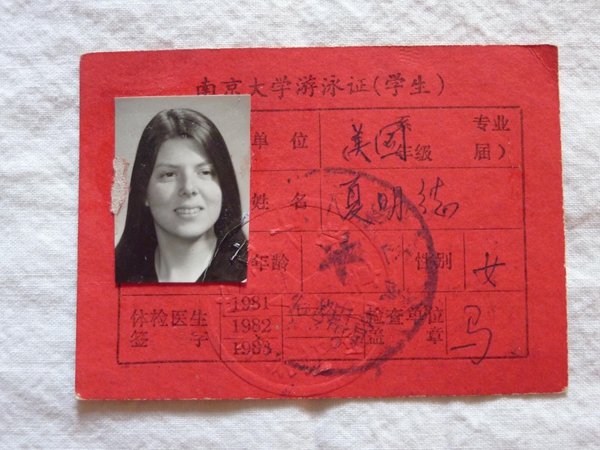 |
|
Lynda Bell's Nanjing University swimming pass in 1979.[Photo provided to China Daily] |
"Accused of being a rightist, she had experienced her own share of pain and pathos, away from public view. But the Ding Ling I met was gentle, warm and gracious, not bitter. Meeting her was a privilege I could never have imagined."
Meanwhile, at Nanjing University Allee was enjoying another privilege, that of having one-on-one tutoring with a very knowledgeable professor of ancient Chinese literature.
"That's because there weren't any other foreign students who were studying that level of classical Chinese," Allee says.
In his dormitory the two pored over a woodblock print copy of Wenxuan (Selection of Refined Literature), complied between 520 and 530 by Xiao Tong, a royal prince, in the city of Jiankang, modern-day Nanjing.
"It was not a modern book at all and had no punctuation, so that was the best training for me," says Allee, who was able to continue his study in a one-on-one fashion years later, when he joined the Freer Gallery of Art & Arthur M.Sackler Gallery in 1988.
"The senior curator of Chinese painting and calligraphy was originally from Shanghai. He wanted me because of my background in classical Chinese. Texts are an integral part of ancient Chinese painting, which I knew little about at the time. So he took me to the museum storage and explained everything to me, step by step, over the next seven years."
At Nanjing University a surreal moment came when Allee watched Elizabeth Wichmann, "the token art student" as she calls herself, rehearsing for her jingju (Peking Opera) performance. Wichmann, who arrived in the autumn of 1979, was among the second group of 50 students and academics the CSCPRC sent to China.
"The texture of life in China was completely different then," says Wichmann, who remembers waiting in line for a couple of days outside a telegram office to make a phone call to her dissertation adviser at the University of Hawaii, where she had studied Asian theater.
"We just camped out during the night, like what people did at rock concerts. When it was finally my turn, my heart raced: what if my professor wasn't by his phone? Luckily enough for me he was."
Wichmann was later taken on by Shen Xiaomei, a disciple of the jingju maestro Mei Lanfang who traveled and performed in 1930 in a number of US cities including Honolulu, Hawaii, where his recordings became wildly popular. Wichmann had become the first person to come under Shen's tutelage as an adult. Fascinated by the sound aspect of jingju, Wichmann, with the help of her Chinese academic adviser, a staunch supporter of hers, tried to get her intonations right by listening to and then reciting children's stories. The two also compiled an English-Chinese glossary of traditional Chinese theatrical language.